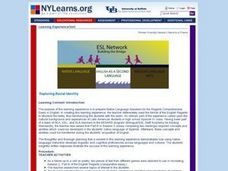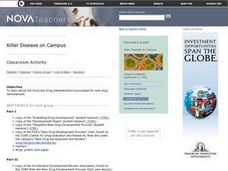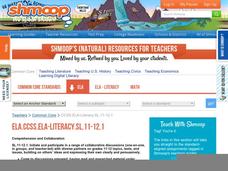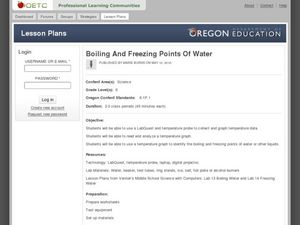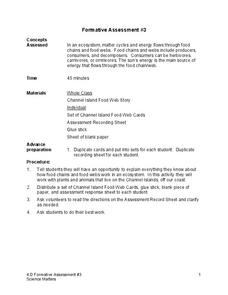Curated OER
Don't Get Caught!
In this fish worksheet, students read about fish and write about how they can help fish. They write about how they can save fish, fish migration, fish getting sick, and testing for pollution in water.
Curated OER
Voyage of the St. Louis
Ninth graders explore the lives of Jewish refugees during WWII. After reading a brief passage about the people and the voyage of the St. Louis, 9th graders discuss how refugees have been treated historically. Reading and testing...
Curated OER
Design Your Own Biological Experiment
Young scholars work together to research a topic of interest to them. They form hypothesis and complete experiments testing them. They present their findings to the class.
Curated OER
Sink or Float?
Students examine how weight and balance can effect if an item sinks or floats. They listen to the book "Who Sank the Boat?" by Pamela Allen, and discuss how the smallest animal sank the boat. Students then conduct an experiment in...
Curated OER
ESL Network: Exploring Racial Identity
Twelfth graders drill for the Regents Comprehensive Exam in English by answering questions about selected readings as preparation for writing essays. After answering the questions, they compose essays adhering to formal written Spanish...
Curated OER
Fish
This short activity, with a reading passage and questions, could be part of a test preparation activity. Through answering the 10 questions students practice comprehension and vocabulary skills.
Curated OER
Genetics, Birth Disorders, and Pregnancy
Students in an alternative school setting for pregnant teens examine various facets of pregnancy including prenatal and postpartum testing, genetic influences, and additional risk factors. Through videos, hands-on activities, and small...
Curated OER
Science and Values: Using Science to Shape Our Future
Young scholars explore and discuss the link between values and science. They read several articles on such topics as global warming, cloning, genetically modified crops and animal testing and then identify the subjective aspect of...
Curated OER
Water Quality and Dissolved Oxygen
Learners investigate the relationship between dissolved oxygen and organic materials and aquatic organisms. This is a 3-lesson plan series in which students explore dissolved oxygen and then design an experiment testing the effects of...
Curated OER
Killer Disease on Campus
Students identify and evaluate the current FDA procedures for drug development, testing and approval. They conduct Internet research, work in groups to create charts and participate in a class discussion about the pros and cons of...
Curated OER
Sail Through History: American West and History of Medicine
In these reading strategies worksheets, students learn reading hints, tips and the S.A.I.L. reading strategy. Students use the methods to learn about American history and the history of medicine.
Curated OER
Reading and Thinking About Evolution
Students explore evolution. They read magazine articles related to evolution. Students describe arguments for/against evolution that the author used. Students discuss their findings.
National Institute of Open Schooling
Aldehydes, Ketones and Carboxylic Acids
Although their name makes them sound dangerous or toxic, carboxylic acids are found throughout nature in things such as citric acid, vinegar, and even in your DNA. Through detailed readings, discussions, and answering questions...
Curated OER
Carbon Dioxide - Sources and Sinks
Where does all of the carbon dioxide come from that is supposedly leading to climate change? Earth science pupils test animal, plant, and fossil fuels as sources in this investigation. Using an indicator, BTB, they are able to detect the...
Shmoop
ELA.CCSS.ELA-Literacy.SL.11-12.1
You want your class to meet all of the Common Core standards, and here is one way to tackle the first speaking and listening standard. Given a theme to focus on from "How Much Land Does a Man Need?" by Leo Tolstoy, small groups come up...
Curated OER
Boiling and Freezing Points of Water
Challenge your sixth graders with this lesson about the freezing and boiling points of water. In these activities learners graph temperature data, read and analyze information, and identify the freezing and boiling points of water and...
Growing Minds
Growing Minds: Cabbage Exploration
It's all about cabbage in this scientific observation resource! After reading a related story, learners explore three varieties of cabbage. They observe the leaves using a leaf diagram, predicting what the middle might look like. They...
Curated OER
Scientific Detectives
Students examine the legitimacy of advertisers' claims about products using science and critical thinking. They view and discuss ads, read a case study, and conduct an experiment to demonstrate whether a product lives up to its claims.
Curated OER
Ecological Cycles Part 1
Knowing about the hydrologic cycle is the first step to understanding the carbon cycle. Upper graders discuss the earth's water content, polar ice caps, and the concept of the ecological cycle as it applies to carbon, nitrogen, and other...
English Enhanced Scope and Sequence
Differentiate between Formal and Informal Language
The Pledge of Allegiance, the Gettysburg Address, the National Anthem, and the Preamble to the Constitution all get close attention in an exercise that asks learners to rewrite these formally-worded documents into informal language....
Virginia Department of Education
Mineral Identification
What's the difference between a rock and a mineral? And what properties are used to identify minerals? The first installment of a five-part series on earth materials and processes prompts young scientists to identify a set of...
Virginia Department of Education
Go with the Flow
How does nature's hierarchy relate to our local human environment? Answer this question, along with others, as the class visually depicts the natural hierarchy provided by nature. Pupils discuss each piece of the pyramid and its energy...
Virginia Department of Education
Perfecting Squares
Here's a perfect way to introduce perfect squares. Individuals color in the diagonals of squares and record observations about patterns. They connect their diagrams to exponents of two and perfect squares.
Science Matters
Formative Assessment #3
Thirteen short-answer questions follow a brief food web activity in a formative assessment designed to test knowledge of ecosystems and the energy that flows through them.
Other popular searches
- Reading Test Preparation Ny
- Testing Reading Speed
- Standardized Testing Reading
- Reading Test Practice Papers






